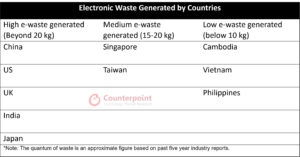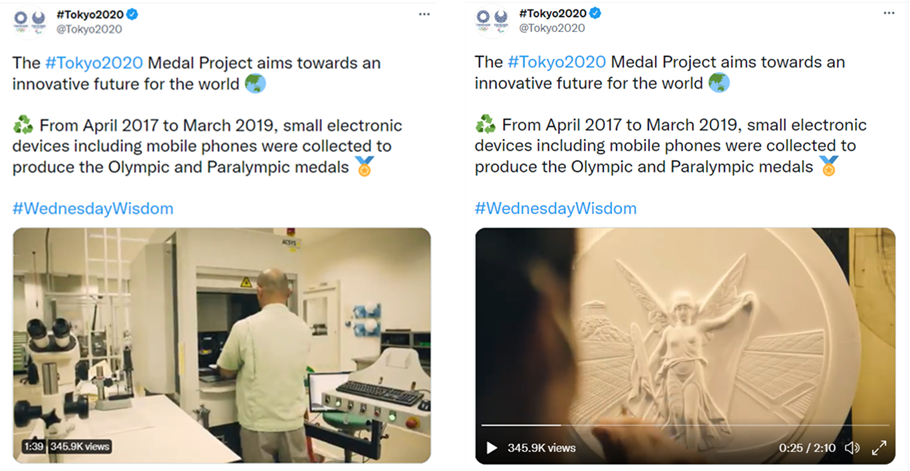Electronic items discarded as waste by the world weighed over 50 million tonnes in 2019, the most recent year for which data is available. This is a 20% increase from the previous five years. The volume is expected to soar in the following years thanks to the coronavirus-triggered surge in dependence on technology. During the 2020-2030 decade, we can expect to generate 40% more electronic waste. The corresponding global e-waste recycling rate will be only 20% (industry insights). In the discarded e-waste, most of the devices containing lithium-ion batteries (mostly smartphones) pose a significant risk to the environment. A major chunk of e-waste is getting dumped in Asian countries due to the rise of affluent consumers and affordability of electronic gadgets.

Smartphones contribute to 12% of global e-waste. This number will continue to increase unless we take measures to check it. From the perspective of carbon emissions, smartphone production alone contributes 80-90% of carbon emissions by the device. Given this scenario, consumers, manufacturers and governments have certain responsibilities which they need to be serious about.
Why electronic devices, more so mobile phones, need to be carefully handled as e-waste?
An electronic device such as the mobile phone has over 60 different metals, present in very small quantities. Among all the metals used in mobile phones, rare earth metals play a crucial role. They can also cause soil and water contamination if not disposed of properly. Besides, demand for more mobile phones increases mining activities for these metals, which adversely impact the environment at the extraction stage itself. Since these metals are available in limited quantities, their higher consumption has already led them to be listed as ‘endangered metals’. Moreover, to make a single mobile phone, almost 6-7 kg of high-grade gold ore gets mined. The fact that most of the metal parts in a mobile phone can be recycled with very little waste generated is being conveniently ignored by most of the industry.
Is recycling the solution?
Recycling does seem to be the obvious solution. A first-of-its-kind nationwide effort was initiated in Japan to recycle e-waste to produce medals for the 2020 Tokyo Olympics. At the same time, undertaking recycling without following proper norms for the collection and treatment of e-waste can adversely impact the environment as well as recyclers.
Tokyo Olympics Medals Made from Electronic Waste

Right to repair
The UK has cleared the Right to Repair legislation that gives consumers the right to repair their own electronic devices and requires the manufacturers to supply the necessary spare parts. The EU and US are expected to follow suit soon. This move can be considered a step towards having a circular economy, a topic already being debated in European and some other countries. France is one of the first countries to come out with a repairability index. The country’s repairability index has five electronic devices — smartphones, laptops, TVs, washing machines and lawnmowers. It mandates a clear display of information on the repairability of the electronic equipment being used. The objective is to encourage consumers to choose more repairable products and eventually make manufacturers improve the repairability of their products.
The success of the right to repair movement depends on how many countries and regions join it and take legislative and policy measures in the direction. Europe has an important role here in influencing other regions due to its large number of member countries and its ability to establish global standards and convince manufacturers to make design and other changes in their products.
Advocacy against right to repair
Tech firms like Apple, Microsoft and Amazon have opposed certain aspects of the right to repair movement. They argue that opening their intellectual property to third-party repair services could lead to exploitation and impact the safety and security of devices manufactured by them. However, a few firms including Apple Microsoft have recently given in to this movement. Starting early next year, Apple plans to make parts and tools available to those in the US who are comfortable with undertaking their own repairs. The decision will initially apply to the iPhone 12 and iPhone 13 after which it would be extended to Mac computers with M1 chips. The facility will be expanded to other countries later in 2022.
Unfolding future
For the longest time, tech companies have been working to reduce the lifespan of their products and make their repair difficult and expensive. This has pushed the consumers to buy a new product instead of repairing it. Right to repair and other such movements are a step towards changing this narrative. Going forward, producers and manufacturers are expected to bear maximum responsibility, but support from governments and consumers is equally important.
At a time when changing smartphones has become a very common practice, changing the consumer mindset towards the concept of sustainability and the need for longevity of their devices is both the key and a challenge. France is now rejecting the ‘throwaway culture’, making considerable strides towards its sustainability dream. Its ‘anti-waste Bill’ in 2019 and now repairability index speak for its intentions.
Such interventions by governments, along with incentives, will not only hold good for the environment but also make sound economic sense by ensuring our devices stay in use as long as possible.

